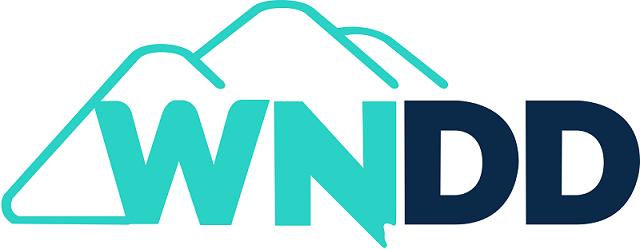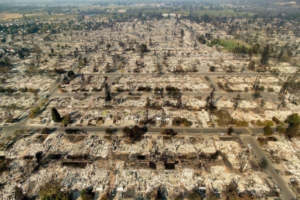Reno Stead Water Reclamation Facility & Tahoe Prosperity Center
A City of Reno water infrastructure project essential to regional business and long-term job growth was given a $5 million boost from the U.S. Department of Commerce’s Economic Development Administration (EDA). The largest ever EDA grant to a Western Nevada Development District (WNDD) member, it will help fund the Reno Stead Water Reclamation Facility (RSWRF) Effluent Treatment, Storage and Reuse project to help expand the region’s ability to process effluent and provide quality water for reuse by commercial users, new and old in Reno, Nevada.
The EDA also announced a grant award of $164,348 to the Tahoe Prosperity Center to facilitate a Tahoe Basin-wide Economic Recovery and Resiliency Plan.
Both projects were supported by the Western Nevada Development District’s 2020-2025 Comprehensive Economic Development Strategy, also known as a CEDS. The projects emerged from a selection process that identified and ranked projects of regional significance that will support jobs and create economic resiliency.
The infrastructure improvements at RSWRF not only allow the facility to support current and future business interests, including the proposed Reno Stead Airport Logistics and Manufacturing Park, but also commercial growth and business expansion planned in the nearby Reno-Sparks Indian Colony.
“This project will support business expansion, decrease the need to import water from outside the region, and lessen the likelihood that future flood events will impact local businesses,” said Dennis Alvord, Acting Assistant Secretary of Commerce for Economic Development.
The City of Reno estimates that this investment will help create 167 jobs, save 48 jobs, and leverage $76,750,000 in private investment. The EDA grant was matched with $9.8 million in local fund.
The Tahoe Prosperity Center (www.tahoeprsperity.com) will facilitate the recovery and resiliency plan with local business, political, education, and community leaders, along with government jurisdictions, non-profit partners, and Tahoe’s residents, according to its CEO Heidi Hill Drum.
“Tahoe’s Transition – Economic Recovery to Resiliency will create an action plan with steps for the region to implement to diversify the regional economy, which has become dangerously dependent on the Tourism sector,” Hill Drum said in a recent press release. Since the Great Recession, the Tahoe Basin has transitioned from 42 percent reliance on the Tourism sector to 62 percent. Tahoe struggled to get back the 5,000 jobs lost in 2008 and when the COVID-19 pandemic hit, the region lost another 9,000 jobs, according to the Prosperity Center.
From public works projects that drive new opportunities and build infrastructure, to regional partnerships that foster a skilled workforce, WNDD is an important economic development partner for new businesses entering western Nevada’s business landscape and for fostering projects that create economic resilience.
Cornerstone to these efforts is the CEDS — a locally-based, regionally-driven economic development planning process and document that successfully engages the region’s community leaders, private sector partners, and stakeholders in planning for the region’s future. Members submit applications to WNDD for the CEDS ranking process. After the careful review of the proposal by a member committee, the projects are ranked by a number of criteria including measurable regional economic benefits, measurable community benefits, fully-developed plan and strategy, and alignment with the CEDS goals and objectives, along with local and regional support.
These projects then become part of WNDD’s annual work plans which include the application for grant monies from the EDA or other applicable federal grant providers. The WNDD member agencies are in a greater position to attract federal funds and technical assistance by demonstrating resources are used efficiently and effectively reflected in the CEDS.
To date, WNDD has helped its members secure over $35 million grants or low-interest loans.

 Jillian Donatto is lead staffer in administering programs in support of members of the Houston- Galveston Area Council and the Gulf Coast Economic Development District; leading design and execution of a 2-Year Action Plan for COVID-19-related economic recovery; support other programs across the Sustainable Development Portfolio ranging from regional conservation to transport.
Jillian Donatto is lead staffer in administering programs in support of members of the Houston- Galveston Area Council and the Gulf Coast Economic Development District; leading design and execution of a 2-Year Action Plan for COVID-19-related economic recovery; support other programs across the Sustainable Development Portfolio ranging from regional conservation to transport. Sean McGlynn was named Santa Rosa City Manager in 2014. He was previously a deputy city manager from El Paso, Texas overseeing a range of departments including aviation, planning and economic development. Last year, Mr. McGlynn was named City Manager of the Year by the California City Management Foundation for going “beyond the call of duty to lead and serve the community.”ation & land use planning.
Sean McGlynn was named Santa Rosa City Manager in 2014. He was previously a deputy city manager from El Paso, Texas overseeing a range of departments including aviation, planning and economic development. Last year, Mr. McGlynn was named City Manager of the Year by the California City Management Foundation for going “beyond the call of duty to lead and serve the community.”ation & land use planning. Mark R. Schonberg (U.S. Army Colonel, Ret.) is President of TerraScale, a clean infrastructure design and development firm that is bringing Project Energos; a 3,700 acre mixed-use development near Fernley NV Reno, NV that aims to enable secure, swift storage and transmission of data between government agencies and commercial client. Schonberg has more than three decades of senior leadership in the United States Military in the IT services, Cyber Security and data center construction.
Mark R. Schonberg (U.S. Army Colonel, Ret.) is President of TerraScale, a clean infrastructure design and development firm that is bringing Project Energos; a 3,700 acre mixed-use development near Fernley NV Reno, NV that aims to enable secure, swift storage and transmission of data between government agencies and commercial client. Schonberg has more than three decades of senior leadership in the United States Military in the IT services, Cyber Security and data center construction. Hurricane Harvey was a Category 4 storm that hit Texas on August 25, 2017. It caused $125 billion in damage according to the National Hurricane Center. The storm dumped 1 trillion gallons of rain on Houston in four days, forcing 32,000 people out of their homes and into shelters There were 61 drinking water facilities that were inoperable and 203 boil-water notices in effect. Another 40 wastewater treatment facilities were inoperable.
Hurricane Harvey was a Category 4 storm that hit Texas on August 25, 2017. It caused $125 billion in damage according to the National Hurricane Center. The storm dumped 1 trillion gallons of rain on Houston in four days, forcing 32,000 people out of their homes and into shelters There were 61 drinking water facilities that were inoperable and 203 boil-water notices in effect. Another 40 wastewater treatment facilities were inoperable. The Tubbs Fire started the evening of Oct. 8, 2017 and burned a total of 36,807 acres in Napa and Sonoma counties — destroying 5,636 structures and resulting in the deaths of 22 civilians Much of the fire’s destruction was in Santa Rosa, particularly in the Coffey Park and Fountaingrove neighborhoods. The estimated cost of the fire’s destruction is between $7.8 to more than $10 billion.
The Tubbs Fire started the evening of Oct. 8, 2017 and burned a total of 36,807 acres in Napa and Sonoma counties — destroying 5,636 structures and resulting in the deaths of 22 civilians Much of the fire’s destruction was in Santa Rosa, particularly in the Coffey Park and Fountaingrove neighborhoods. The estimated cost of the fire’s destruction is between $7.8 to more than $10 billion. The COVID-19 pandemic highlights that we have entered the internet of all things, people and systems. Connectivity is essential for creating and sustaining economic growth and providing improved government services. This has also introduced enormous risks. Business and government agencies are increasingly a target for hackers and cybercrime, both globally and locally: SolarWinds, a major US information technology firm, was the subject of a cyberattack that spread to its clients and went undetected for months. In 2019, the Lyon County School District was the victim of a computer ransomware virus attack.
The COVID-19 pandemic highlights that we have entered the internet of all things, people and systems. Connectivity is essential for creating and sustaining economic growth and providing improved government services. This has also introduced enormous risks. Business and government agencies are increasingly a target for hackers and cybercrime, both globally and locally: SolarWinds, a major US information technology firm, was the subject of a cyberattack that spread to its clients and went undetected for months. In 2019, the Lyon County School District was the victim of a computer ransomware virus attack.